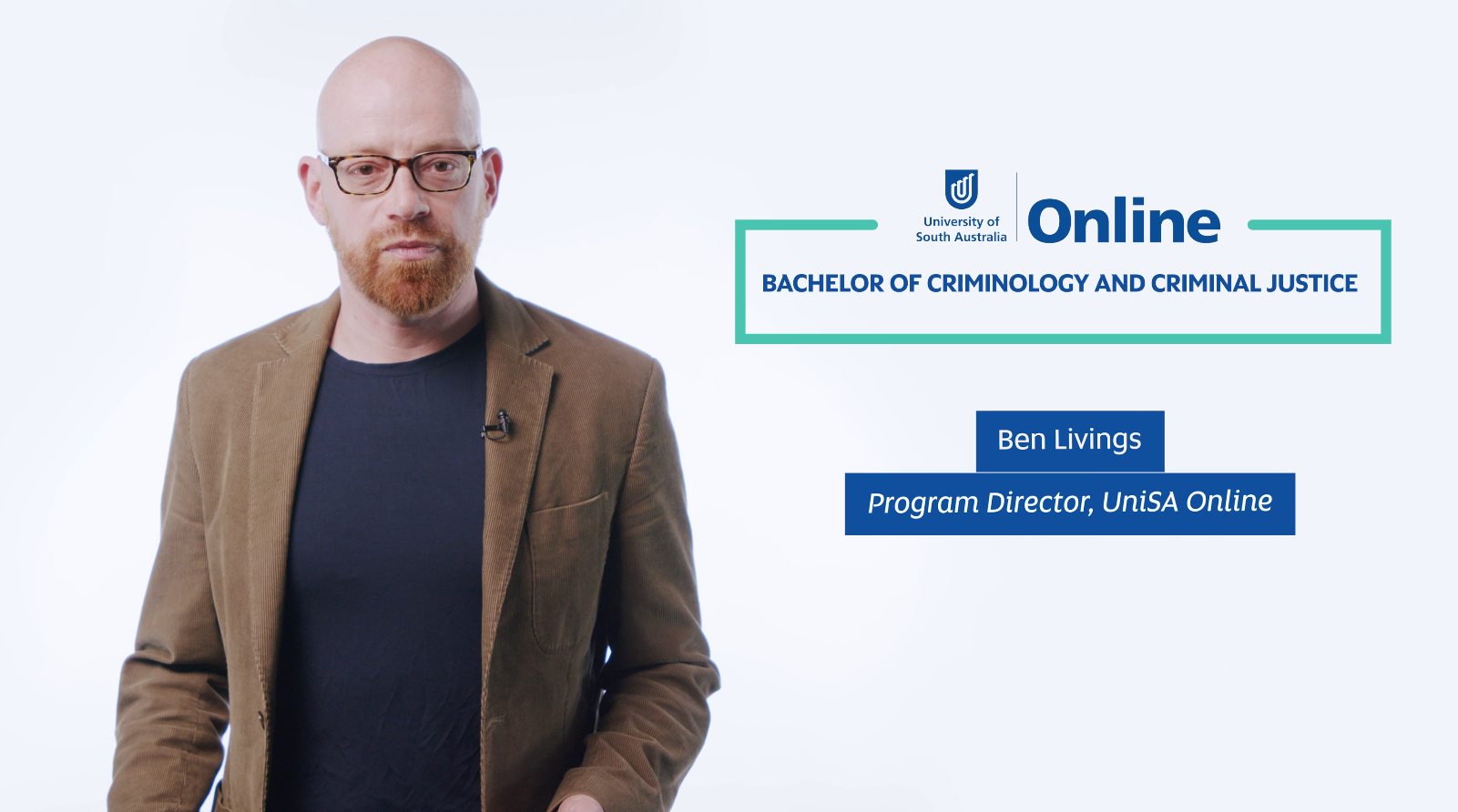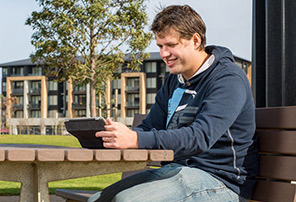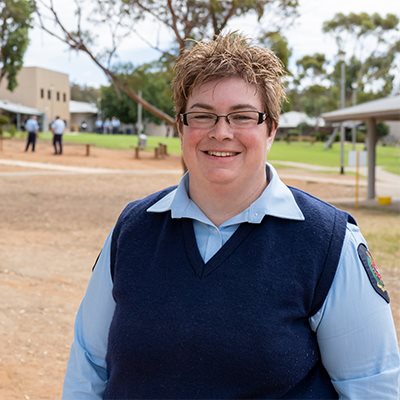You're viewing degree information for International students
You're an International student if you are:
- NOT an Australian or New Zealand citizen
- NOT an Australian Permanent Resident (including Permanent Humanitarian Visa holders)
Please remember your residency (the country you are currently in) has no impact on whether you are an Australian or International student.
UniSA Online degrees normally require international students to study outside of Australia. If you would like to study a UniSA Online degree within Australia, your visa conditions will need to allow online study. For advice on eligibility to study onshore in Australia, please contact us.
Bachelor of Criminology and Criminal Justice
Degree Level Undergraduate
Year 2025
-
View full entry requirements Hide full entry requirements
Entry requirements
Admission criteria
The admission criteria have been grouped to assist you to easily find the information most relevant to your circumstances. However, you may fit into more than one and the university will consider applicants against each of the relevant criteria.
Certain conditions apply. For more information refer to Appendix 4 of the University's Selection and Entry policy.
Applicants are required to meet one of the following criteria with a competitive result:
Higher education study
- Successfully completed equivalent to a minimum of half a year of full-time study of a higher education program at a recognised higher education provider
OR
Vocational Education and Training (VET)- Complete an award from a registered training organisation at Certificate IV or above
OR
Work and life experience (for domestic students only)- Passed a UniSA Online literacy and numeracy test and have relevant work experience, or
- Completed a 12-month UniSA Foundation Studies program or equivalent, or
- Qualify for Special Entry
OR
Recent secondary education- Completed a secondary education qualification equivalent to SACE, such as an interstate year 12 or international qualification
Essential requirements for admission
Prerequisites
NoneAssumed Knowledge
NoneEnglish language entry requirements
In addition to meeting academic entry requirements, international students who speak English as a second or additional language must also meet the University's English language entry requirements. The minimum language requirements for this program are:English language testPlease access the following link for a comprehensive list of English language tests accepted by UniSA and other important information in relation to meeting the University’s language requirements: English Language Equivalence Table (PDF)- IELTS total [6.0]
- IELTS reading [6.0]
- IELTS writing [6.0]
- IELTS speaking [6.0]
- IELTS listening [6.0]
Admission Requirements by Country
Bangladesh HSC 3.5 Canada High School (OSSD) 60 Eynesbury FSP 310 German Abitur 3.8 Kenya KCSE (average) B Malaysia STPM (best 3) 6 Malaysia UEC 32 Norway GPA 2.8 Pakistan HSSC 75 Sri Lanka A Levels (best 3) 6 Sweden GPA 12.5 UK Board GCE A Levels/HK Board 6 Vietnam 7 Australia 65 IB (best 6) 26 USA SAT (1600) 1050 India (best 4) State Board 60 India (best 4) Central Board 60 HKDSE 15 Nepal NEB 2.41
Degree overview
- Gain a holistic understanding of the causes of criminal behaviour, the inner workings of the criminal justice system, and the skills required to advocate for social justice.
- Explore contemporary approaches to topics such as youth justice, offender rehabilitation and desistance, human rights, cybercrime, victimology and globalised crime.
- Learn the core principles, approaches and assessment techniques used in industry.
- Develop analytical and research skills and apply these to real issues and scenarios.
- Study an award-winning1 degree informed by industry experts, including current and former police officers, high-ranking detectives, researchers working in partnership with the Australian Institute of Criminology, and legal specialists.
1The Australian and New Zealand Society of Criminology (ANZSOC) Teaching Excellence Award, 2019.
Snapshot

Study On Demand – this is a 100% online criminology and criminal justice degree designed specifically for online learning. With UniSA Online, you can take full control over your study, access support seven days a week, plan your study to fit around your life, view learning resources 24/7, and log in to the interactive online environment anywhere, any time and on any device.
Crime impacts almost every facet of society, from cybercrime costing Australians billions of dollars each year, to violence and vandalism affecting the safety and liveability of communities.
Understanding the motivations behind criminal behaviour is integral for professionals on the frontline of the justice system as they work to prevent crime, assist those affected by it, and minimise its impact on society.
Informed by the most up-to-date research, current trends, industry experience and digital innovations, this degree provides a holistic understanding of the psychological, sociological and legal factors influencing contemporary criminology and criminal justice. You’ll graduate with highly sought after skills and knowledge, ready to step straight into a rewarding career.
What you'll learn

You’ll develop a fundamental understanding of crime and the criminal justice system, spanning policing investigations and intelligence, human rights and social justice, offender desistance and rehabilitation, and justice in practice, coupled with critical research and analytical skills.
Learn from industry experts and criminal justice specialists, and examine policing investigation and intelligence through a custom-made feature film unique to UniSA. You’ll be challenged to apply your knowledge to timely issues, including cybercrime, the over-representation of minority groups in the justice system, crimes related to gender and sexuality, and how policing practices affect Aboriginal Peoples.
Study the same contemporary principles, approaches and assessment techniques used in industry, ensuring you have a competitive edge in launching a new career or advancing in your current field. Our experienced academics have brought together strong industry connections and cutting-edge research to deliver an interactive and industry-recognised degree.
Tailor your learning to your interests with the opportunity to choose a minor in psychology, social policy, community health, ageing and disability or public health, allowing you to gain specialised and in-demand skills.
Graduate with the essential skills and technical knowledge to make a difference in a complex field, advocating for positive change to improve the lives of individuals and communities, and make a lasting impact on real issues.
Why Bachelor of Criminology and Criminal Justice

Study an award winning1 degree designed to respond to increasing industry demand for criminology and criminal justice specialists, with a curriculum that delves deeper than just process and procedure to examine crime and justice through an interdisciplinary lens.
Criminology and criminal justice professionals have a unique opportunity to make a meaningful difference in the lives of people and the wellbeing of society, whether it be within the local community or on the global stage.
With a focus on applied learning, the Bachelor of Criminology and Criminal Justice will equip you with the skills to not just administer or enforce criminal justice, but to understand the causes and effects of crime, how relevant systems could be enhanced, and how to advocate for a more just society.
If you want to help people as they navigate the justice system, contribute to a better understanding of crime and criminal behaviour, improve the outcomes for vulnerable groups through systemic policy change and action, investigate and prevent crime, or advocate for human rights and social justice, a career in criminology and criminal justice could be the perfect way to turn your passion into real impact.
1The Australian and New Zealand Society of Criminology (ANZSOC) Teaching Excellence Award, 2019.
Your career
Careers within the criminology and criminal justice sector encompass a diverse range of opportunities and pathways, including roles in government agencies, law enforcement, intelligence, social welfare, research, rehabilitation, corrections and not-for-profit organisations.
Careers to consider:
- Criminologist: Work with law enforcement agencies to develop crime prevention strategies and policies; analyse and interpret emerging trends in crime, antisocial behaviour and sentencing; research issues related to crime and the justice system, including victim impact, offender rehabilitation and social justice; examine the causes of criminal behaviour, and the psychological and sociological influences on offenders.
- Policy adviser: Develop and analyse policies guiding the design, implementation and modification of government or commercial operations and programs; conduct environmental scans to identify and develop options to address topical and emerging issues, trends, risks and opportunities in the criminal justice system; research, analyse and prepare papers, briefings and reports on a range of criminal justice issues.
- Strategic policy and planning manager: Lead policy development and planning activities to help inform the ways in which criminal justice activities occur; provide authoritative policy advice on complex and potentially sensitive strategic matters; possess an understanding of the criminal justice system, key stakeholders and contemporary challenges, as well as government functions and processes; inform the community about changes to legislation and reform.
- Police officer (with further training): Investigate crime and respond to community safety concerns; enforce the law to maintain public order, including patrolling public areas or making arrests; attend critical incidents and emergencies and assist victims of crime and accidents; gather evidence, interview victims, witnesses and offenders, and prepare detailed reports.
- Intelligence and policy analyst: Gather, analyse and evaluate information from a variety of sources; determine the significance and reliability of incoming information; establish and maintain intelligence records and files; develop and analyse policies to guide the design, implementation and modification of government and commercial operations and programs.
- Correctional services officer: Undertake a frontline role in the prison system, and be responsible for a wide range of duties relating to the safety, security and welfare of prisoners; manage day-to-day issues and contribute to the ongoing rehabilitation of offenders; develop and deliver rehabilitative and training programs for offenders; write clear and concise reports, statements and records; assess and counsel offenders in matters affecting their welfare, security, behaviour and routines.
- Child protection officer: Respond to the concerns regarding the safety and wellbeing of children; help families strengthen their capacity to provide care and safety for children and other family members; manage alternative care for children and young people removed from unsafe environments.
Learn more about your career in Criminology and Criminal Justice >
Thinking of studying soon?
Enquire now to study with UniSA Online
Control how and when you study with our 100% online degrees.
Your study experience and support
Study On Demand
Our online career-focused degrees give you full control and ultimate flexibility over your study. It’s Study On Demand, on your schedule, on your terms.
- Designed specifically for your online learning
Designed by a team of academic and online experts, our course materials are delivered in an interactive way using innovative digital technology and state-of-the-art teaching and learning resources. - Study when it suits you
Our online degrees support students who lead busy lifestyles. With four start dates a year in January, March, July and September there is no need to interrupt your life. - Take control of your study schedule
With all content available from day one of your course, you have the power to plan your study schedule in advance. - Finish each course in 10 weeks
Our courses are delivered within 10-week terms to keep you motivated throughout your degree. Study two courses a term or just one. - 100% online study
You won’t need to come onto campus for coursework, assessments or exams. Complete all study for your degree where it suits you. - Get the help you need
Whether you need help with course content or assessments, we offer the academic support and services you need to be successful in your studies. - Adjust your study to your life
There’s no need to interrupt work and family life or spend money on travel and student accommodation. Organise study around your life. - Learn from world-renowned academics
Get a degree that’s designed and taught by leading academics and industry professionals. - 100% online interactive learning environment
Our interactive online learning environment supports all your study needs. Log in anytime, on any device, wherever it suits you. - Access a library of over 700,000 digital resources
Access a library of more than 700,000 digital resources including e-books, videos and journal articles. Our Ask the Library virtual service can help you locate, access, evaluate, use and reference a range of information resources.
What others are saying
IT Requirements
Generally, any desktop or laptop computer purchased in the past three years should be capable of meeting your online learning needs. While mobile devices such as tablets and smartphones will be able to access most of your online course content, there are likely to be elements of most courses where we recommend you use a desktop or laptop computer. Your computer should be able to:
- run a modern browser (Microsoft Edge, Firefox 24, Safari 5, or Chrome 32 or later versions)
- run Java
- run programs to create documents, spreadsheets and presentations
- use a web camera and headset (or ear pods with microphone)
- Some UniSA Online degrees require an online exam. The online exam software – Remote Proctor Now – has specific capability requirements. Please refer to the system requirements prior to conducting your exam to ensure your computer is compatible.
Access free IT software and resources
As a UniSA Online student, you'll:
- Get free access to the full Office 365 ProPlus suite, which includes full versions of Word, PowerPoint, Excel, Outlook, OneNote, Publisher, Access and Lync software. Install the full suite on up to five different devices (PC and Mac compatible).
- Get 1Tb of personal storage that syncs with your PC or mobile device through OneDrive - it's like an extra hard drive that allows you to open any of your files from any of your devices, whenever you need them.
- Get free access to LinkedIn Learning - Access more than 5000 video courses on a broad range of topics such as: the Microsoft Office suite, time management and study skills, health and wellbeing, communication and presentation skills, photography, film making and designing your own games or mobile apps.
- Be able to connect with others using Microsoft Teams, Yammer and the Outlook Web App.
There are some degrees that have specialised software requirements. We've made this software available to students to access for free - you'll be able to download and install any of the required programs on your own device anywhere and anytime. See if your degree requires specialised software.
Check your device
Our computer system test will determine if your device has the base system resources and software required to study online. It'll also check the speed of your internet connection.
See if your computer, laptop or device is all set up and ready to go – it takes just a few seconds.
The application process is easy – just follow these simple steps:
-
Submit an online enquiry
If you're ready to apply, the first step is to fill out and submit our online enquiry form. Here you'll be asked a series of questions to see if you're eligible. Following your online enquiry, one of our Degree Advisers will contact you at your preferred time to discuss the application process.
Enquire now > -
Speak to a Degree Adviser and start your application
If you're eligible, you'll receive an email outlining the entry requirements and the relevant documentation you need in order to be considered.
In order to verify your academic qualifications, you'll need to upload relevant documents like your official parchment, certificates or transcripts. If you have work experience, you will need to upload your CV as well as any other documents like work references, professional recognition or accreditation or your training certification.
Your email will contain information on the specific documents you need to provide as well as a link to begin your application. You'll be asked to create an account and set your own password.
-
Complete your application and send through your documents
In order to proceed with your conditional offer, you’ll need to complete your application and provide required evidence of your previous study or work experience.
Enquire now >
Alternative Pathways
Australian
There are other pathways you can follow to study this degree, including:
- UniSA College Diploma in Social Sciences (Law)
- UniSA College Undergraduate Certificate in University Studies (Social Sciences)
- UniSA Online UniStart
Online Course Facilitator
-
When should I apply?
UniSA Online degrees start four times a year in January, April, June and September. There are key application dates for each term. If you're looking to apply for credit, there are different closing dates you need to be aware of, so it's always best to double check. Key dates can be found at unisaonline.edu.au/key-dates.
-
Do I have to be online at set times?
All of our courses are asynchronous, meaning you choose when to study, whenever it suits you. However, if your degree has online exams, you will need to sit these at a designated date and time. Some courses may also require you to speak to your academics via phone or online communication channels at a mutually agreed time as part of your assessment.
-
What academic support is available?
Our academics are available seven days a week, including weeknights. Throughout your degree, you’ll be supported by our highly experienced academic team of Online Course Facilitators and casual academics. Our teaching team will guide you through your learning and ensure you have an outstanding, high-quality education.
They can help you with your course materials and assessments, provide feedback on your work, assist you with referencing, and can answer any other course-specific queries.
You’ll be able to contact your academics via email, online discussion forums and live messages in the online learning environment. You can also communicate in real-time and chat face-to-face with your academics online.
If you need after-hours learning support, Studiosity is a great resource that can help you with your writing, academic language, grammar and referencing. You’ll also be able to chat online with a Studiosity online adviser.
-
How is my degree structured?
Full-time students study two courses each term. It makes earning a degree completely achievable, especially if you’re working. Your degree is delivered over four terms each year. Each term runs for ten weeks with two-week breaks in between each term.
You’ll also have the option to go part-time, or switch between the two. If you need to take a break in your study, that’s an option too. We recommend speaking to your Student Adviser who can help you update your study plan and check when your courses are offered.
-
What career prospects do I have with my university qualification?
Our degrees are designed in conjunction with industry experts, employers and professional associations, and informed by the latest developments in your field. You will graduate with in demand skills and up-to-date knowledge required by industry.
You will be studying with a university known for its employment outcomes. Your UniSA degree is more than just a piece of paper – it will prepare you to start your career, or take it to the next level. UniSA's online students have graduate employment rates well above the national average.*
UniSA Online qualifications follow the same Government Higher Education Standards Framework as our on-campus degrees. The parchment you receive at the end of your degree will be the same as any other University of South Australia student.
*UniSA External UG full-time employment rate 83% Graduate Outcomes Survey 2018
-
What are the main differences between online, on-campus and distance education?
The knowledge you gain from each mode of study is the same – it's how you get there that's different. When you study online, everything from your course material to weekly activities and assessments are fully online. You'll communicate with academic staff and students via live messages, online discussion forums and email.
Studying on campus requires students to physically come on to campus at specific times to attend lectures, tutorials and practicals. On-campus students have face-to-face contact with academics and fellow students and also communicate via email and online discussion boards.
Distance Education involves physical course material packages being sent to students, usually print based but occasionally audio or video. Communication is usually via telephone, mail and email. In today’s digital era, distance education has been superseded by online education.
More FAQs










